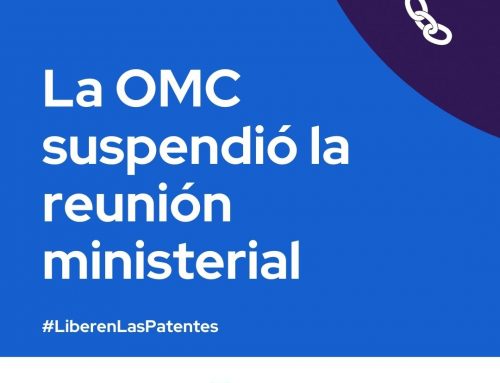BUENOS AIRES, December 15th 2015 – Fundación Grupo Efecto Positivo (FGEP), an organization whose work is focused on guaranteeing access to essential medicines for HIV and Hepatitis C in Argentina and Latin America, announced in a press conference on November 30th two new key actions to defend public health policies. Dr. Daniel Gollán, Argentina’s Minister of Health, joined the conference, as well as prominent government officials and civil society representatives.
These actions are the latest steps taken by FGEP in this direction, following previous actions such as an opposition to a patent application for sofosbuvir (prodrug that represents the cure for Hepatitis C) in May, and a strong incidence and joint collaboration with authorities from the Ministry of Industry to apply health safeguards in relation to intellectual property, and with the Ministry of Health to add a fourth ‘90’ goal on the national adaptation to the “90-90-90” strategy carried on by UNAIDS (90% of HIV treatments at an affordable price).
Judiciary defense to stand for Public Health policies
FGEP filed a presentation as an interested third party –in defense of public health and Access to medicines- in the judiciary case that the Argentinian Chamber of Medicinal Specialties (CAEME in spanish) along with 26 foreign pharmaceutical companies are seeking against the Argentinian State (Ministry of Health, Ministry of Industry and the National Institute of Industrial Property). These companies aim for the anullment of a Joint Resolution that approved in 2012 the Guidelines for the Examination of Pharmaceutical Patents. These guidelines are considered an example worldwide in terms of public health perspective, since they guarantee an adequate administration of pharmaceutical patents system and prevent abuses from the multinational pharmaceutical companies
The Guidelines for the Examination of Pharmaceutical Patents Applications -also known as ‘Anti-Evergreening Resolution’- are a key tool to rationally establish an interpretation of patentability requirements stated in article 4th of Argentina’s patent law (Law 24.481) in relation to ‘novelty’, ‘inventive step’ and ‘industrial application’. All countries belonging to the WTO and signatories of the TRIPS agreement have the faculty to define their patentability criteria, in what represents a vital opportunity to protect public health.
FGEP, with its presentation as interested third party, aims to support Argentina’s right to defense public health against the abuse of multinational pharmaceutical companies that are attacking a set of high standards for patent application´s examination in terms of novelty and inventive step, therefore preventing unnecessary monopolies in the local medicine market that would result in a barrier for the access to treatment for HIV, HepC and other diseases.
Since the adoption of these legitimate measures to protect Public Health affects their commercial interests, multinational pharmaceutical companies are suing the Argentinian State, in a clear strike against its national sanitary sovereignty.
Opposition to a Patent Application for HIV treatment medicine
FGEP also filed a pre-grant opposition at the National Institute of Industrial Property against a patent application for an essential medicine for HIV treatment (Lopinavir+Ritonavir, commercial name ‘Kaletra’). The opposition argues and demonstrates how the patent application from the American company Abbott does not meet the legal patentability requirements and should therefore be rejected. The patent application for Lpr/Rtv (heat stable tablet) has still pending status in Argentina. Abbott claims for a composition, formulations and their technics, doses and methods that according to Argentinian law and the anti-evergreening resolution are not patentable due to lack of novelty and inventive step.
FGEP’s preliminary investigation demonstrates that the vast public investment required to acquire this product has a strong impact on the Ministry of Health’s budget: on its latest purchase, the Ministry spent U$S 10.658.436 (U$S 1,35 per unit) which represents a 23% of the total budget for VIH treatment medicines. However, there are generic versions available in India, being sold at U$S 0,183 per unit.
Lopinavir and Ritonavir (both together and separately) already have several granted patents in Argentina guaranteeing a legal monopoly until 2018. The application that FGEP is opposing to would give Abbott an illegitimate extension of patent protection until 2025, meaning in fact another 7 years of exclusivity to manufacture, sell and import the product at abusive prices, in detriment of the people’s health.
With its partaking in the judicial file as interested third party and the opposition to an illegitimate patent request, FGEP claims and supports the defense of public policies that protect the fundamental Human Right to Health against commercial interests and abuses.
Medicines are not commodities: they’re social goods to guarantee the people’s Health.




Deja tu comentario
Debe iniciar sesión para escribir un comentario.